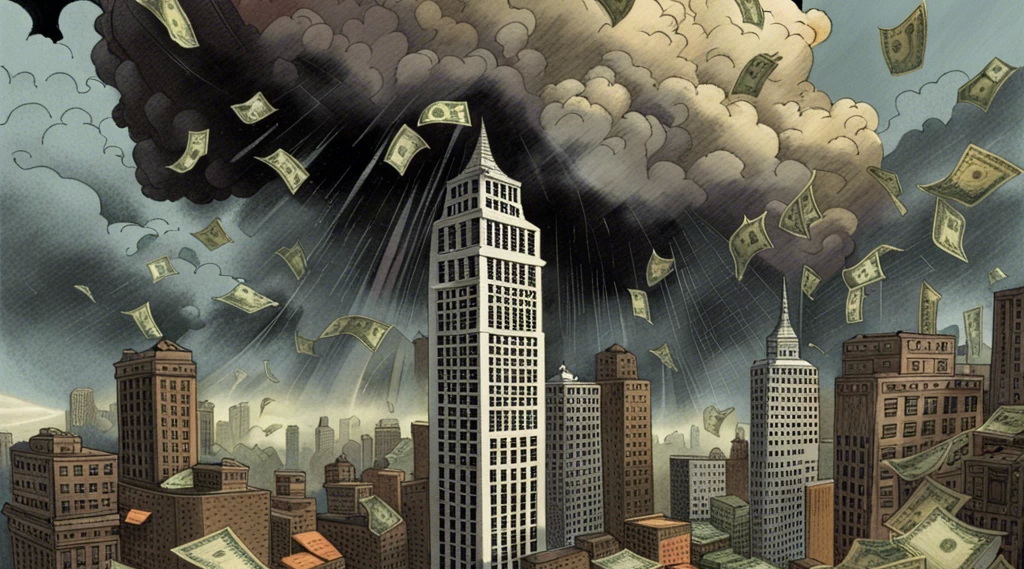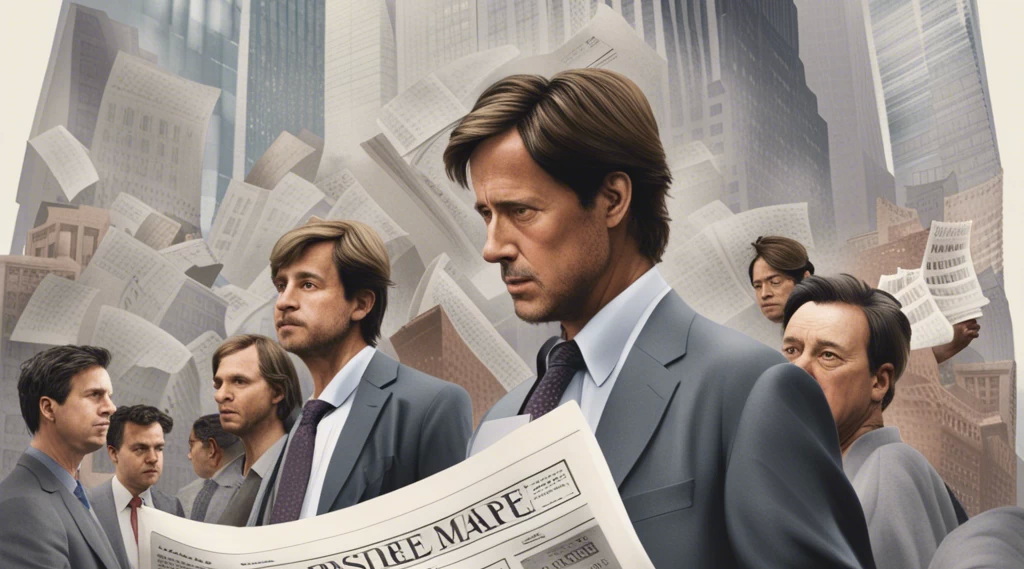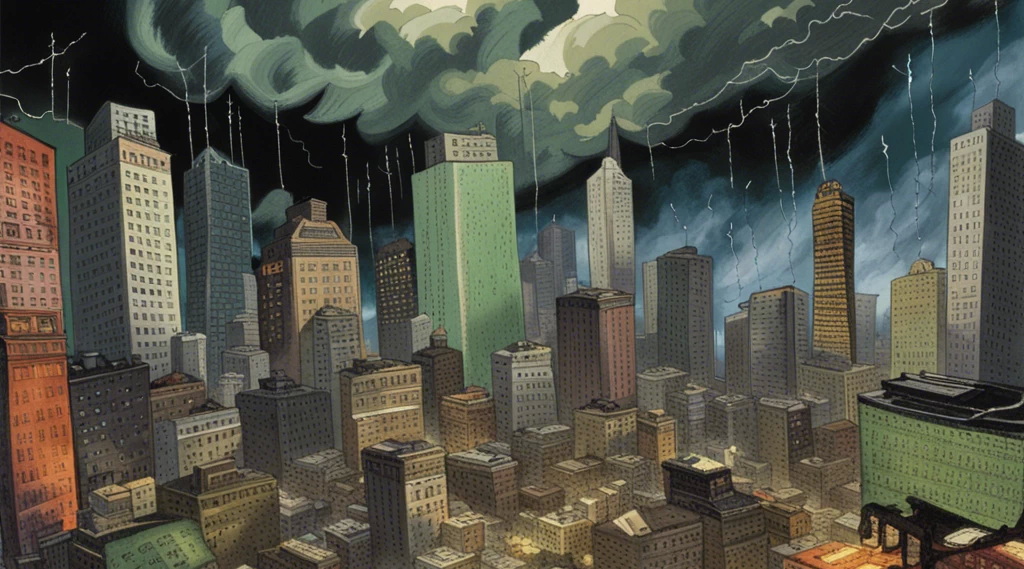The Big Short: Michael Lewis' Account of Wall Street's Collapse
"The Big Short" is a film based on true events that explores the 2008 financial crisis through the eyes of a group of eccentric investors who predicted and profited from the collapse of the housing market.
Chapter 1 What is the Big Short about
"The Big Short" is a non-fiction book written by Michael Lewis, published in 2010. The book explores the events leading up to the global financial crisis of 2007-2008 and focuses on the individuals who predicted and profited from the collapse of the subprime mortgage market.
Lewis tells the story through the experiences of several key figures, including hedge fund managers, investment bankers, and analysts, who discovered the flaws in the housing market and saw an opportunity to bet against it. These individuals recognized the excessive risk-taking and faulty practices within the financial system, ultimately leading to the economic meltdown.
Through meticulous research and interviews, Lewis provides an engaging narrative that explains complex financial concepts and exposes the questionable behavior prevalent in the industry. He highlights the impact of flawed mortgage-backed securities, collateralized debt obligations (CDOs), and credit default swaps, which played a significant role in the eventual housing market crash.
"The Big Short" not only delves into the specifics of the financial crisis, but also explores the broader implications and consequences for the global economy. It reflects on the lack of oversight, the blindness of regulators, and the widespread ignorance regarding the impending disaster. Additionally, the book sheds light on the resulting aftermath, where the financial institutions responsible for the crisis faced minimal consequences compared to the devastating effects experienced by ordinary people.
Overall, "The Big Short" offers a captivating account of the financial crisis, presenting a critical analysis of the systemic issues that led to one of the most significant economic collapses in recent history.
Chapter 2 Why is the Big Short Worth Read
The Big Short, written by Michael Lewis, is worth reading for several reasons, According to reddit comments on The Big Short :
- Insight into the 2008 financial crisis: The book provides a deep understanding of the complex events that led to the global financial meltdown. It delves into the intricacies of subprime mortgage bonds, collateralized debt obligations (CDOs), and credit default swaps, shedding light on the risky practices that contributed to the crisis.
- Engaging storytelling: Despite the complexity of the subject matter, Lewis employs his storytelling skills to make the narrative exciting and accessible. He introduces readers to key players who foresaw the impending collapse and bet against the housing market, allowing us to follow their journey and understand their motivations.
- Educational value: The Big Short helps readers grasp important financial concepts and terminology, making it an educational resource for those interested in finance and economics. Lewis breaks down complex ideas into digestible explanations, making it easier for readers without a background in finance to follow along.
- Critical analysis of Wall Street culture: The book offers a scathing critique of the financial industry and its lack of accountability. Through the narratives of various characters, Lewis exposes the flaws in the system, highlighting greed, incompetence, and the disregard for ethical practices that contributed to the crisis.
- Timeliness and relevance: While the book was published in 2010, its lessons remain relevant today. It serves as a cautionary tale about the dangers of unchecked risk-taking and the potential consequences of a poorly regulated financial system. Understanding the events of the past can help individuals make more informed decisions about the present and future.
Overall, The Big Short is worth reading due to its ability to inform, educate, entertain, and provoke thoughtful reflection on the causes and consequences of the 2008 financial crisis.
Chapter 3 The Summary of The Big Short
This article delves into the captivating world of "The Big Short," a book written by Michael Lewis that offers a compelling exposé on the 2008 financial crisis. With an in-depth analysis of Lewis' narrative, we unravel the intricate web of greed, deception, and avarice that led to the collapse of Wall Street. Join us as we explore the shocking revelations and captivating stories behind "The Big Short" and gain a deeper understanding of the events that shaped the global economic landscape.
Chapter 4 Author of The Big Short Book
The book "The Big Short" was written by Michael Lewis. It was first published in 2010.
Michael Lewis is a renowned American author and journalist known for his works on finance, business, and sports. In addition to "The Big Short," he has written several other notable books, including:
- "Liar's Poker" (1989): This book explores Lewis' experiences while working as a bond salesman on Wall Street during the 1980s. It provides insights into the excesses and questionable practices of the financial industry.
- "Moneyball: The Art of Winning an Unfair Game" (2003): This book delves into the world of baseball and how the Oakland Athletics revolutionized the game by using data and analytics to achieve success.
- "The Blind Side: Evolution of a Game" (2006): This book tells the inspiring true story of Michael Oher, a football player who overcame numerous challenges and found success both on and off the field.
- "Flash Boys: A Wall Street Revolt" (2014): In this book, Lewis investigates the world of high-frequency trading and its impact on the stock market.
Of these books, it is subjective to determine the "best" edition. Each book has its own unique qualities and appeal, catering to different interests and preferences. It ultimately depends on individual readers' interests in finance, sports, or specific subject matter.
Chapter 5 The Big Short Meaning & Theme
1. What does The Big Short Mean
The book examines the intricate details of the financial industry, delving into complex financial instruments like collateralized debt obligations (CDOs) and credit default swaps (CDS). It follows a few key characters, such as hedge fund managers and investors, who realized the inherent flaws in the housing market and bet against it.
In essence, "The Big Short" discusses how a small group of people identified and capitalized on the impending collapse of the housing market, which ultimately led to one of the largest financial crises in history. The book sheds light on the unethical practices, excessive risk-taking, and lack of oversight within the financial industry that contributed to the crisis.
Overall, "The Big Short" serves as a critique of the financial system and highlights the consequences of unchecked greed and the dangers of complex financial instruments. It provides a deeper understanding of the factors that led to the global financial crisis and the subsequent economic fallout.
2. What is the Theme of The Big Short
The theme of "The Big Short" book revolves around the financial crisis of 2007-2008 and the individuals who foresaw the collapse of the housing market and profited from it. The book delves into the intricate world of Wall Street, exploring the greed, corruption, and systemic failures that led to the catastrophic event.
One prominent theme in the book is the notion of human fallibility. It highlights how the collective actions of people driven by self-interest, greed, and a lack of regulation contributed to the crisis. The characters in the book are depicted as outliers who questioned the conventional wisdom and recognized the flaws within the system. They act as a reminder of the importance of critical thinking and skepticism in an environment dominated by conformity and complacency.
Another central theme is the complexity of the financial industry and its inherent opacity. "The Big Short" sheds light on the complicated web of mortgage-backed securities, credit default swaps, and other derivative instruments that few truly understood. Through meticulous research and analysis, the protagonists sought to uncover the truth behind the façade, revealing the fragility of the housing market and the inherent risks lurking beneath the surface.
Moreover, the book explores the ethical dilemmas faced by the characters throughout their journey. As they bet against the housing market and stand to profit from others' misfortune, questions of morality arise. It raises discussions about the responsibility of institutions and individuals, as well as the consequences of unchecked capitalism on society as a whole.
Overall, "The Big Short" presents a scathing critique of the financial industry, exposing its flaws and shedding light on the interconnectedness of global markets. Through its themes of human fallibility, complexity, and ethical considerations, the book serves as a cautionary tale and encourages readers to question the prevailing narratives and systems in place.
Chapter 6 Examining Online References for 'The Big Short'
If you enjoy reading, we have some recommendations for you. If you're interested in exploring different platforms of The Big Short, we suggest taking a look at Bookey. They offer various formats of books and provide summaries as well, making it convenient to access information efficiently. For those who prefer purchasing physical copies, Amazon is an excellent choice. With their vast collection, you can find a wide range of books, including "The Big Short", such as THE BIG SHORT (BLU-RAY, Region A) Christian Bale , Steve Carell , Ryan Gosling , Brad Pitt. Although we are unable to offer a PDF version of "The Big Short" here, our aim is to assist you in finding accessible resources. These resources can help you delve into the principles and strategies presented in "The Big Short" and apply them to your own entrepreneurial journey.
Chapter 7 Quotes about The Big Short
Here are a few quotes about "The Big Short" book by Michael Lewis:
- "Lewis has managed to make subprime finance entertaining and understandable, even for those who don't know the difference between a CDO and a credit default swap. He also has a keen eye for the absurdities of modern Wall Street." - The New York Times
- "A devastating exposé... Lewis writes with such clarity that even the complex financial instruments he describes are comprehensible." - The Washington Post
- "A tour de force...riveting and terrifying." - Time magazine
- "Michael Lewis knows how to tell a story; his writing is engaging, witty, and full of personality. The Big Short is an eye-opening account of the financial crisis that will leave you both educated and entertained." - Forbes
- "A highly entertaining narrative...brilliantly explained... Lewis tells an important story in a way that is accessible and enjoyable for the general reader." - Financial Times
- "The Big Short is a modern classic, a must-read for anyone seeking to understand the causes and consequences of the 2008 financial crisis. Lewis's ability to weave together complex financial concepts and compelling storytelling is unparalleled." - The Guardian
These quotes highlight the book's ability to demystify complex financial concepts while providing an engaging and captivating narrative around the events that led to the global financial crisis.
Chapter 8 Similar to The Big Short
If you're looking for books similar to "The Big Short," which provides an in-depth analysis of the financial crisis, its causes, and the individuals who profited from it, here are a few recommendations:
1.” Outliers “ by Malcolm Gladwell: The book explores the factors that contribute to high levels of success and achievement, challenging traditional notions of merit and talent.
- "The Undoing Project: A Friendship That Changed Our Minds" by Michael Lewis: Although not directly related to the financial crisis, this book by the same author as "The Big Short" explores the collaboration between two psychologists whose research on decision-making and human behavior has had significant implications for understanding financial markets.
- "Flash Boys: A Wall Street Revolt" by Michael Lewis: This book delves into the world of high-frequency trading and the efforts of a group of traders to expose the unfair advantages enjoyed by certain market participants. It reveals how technology has transformed Wall Street and the impact it has on everyday investors.
- "The Greatest Trade Ever: The Behind-the-Scenes Story of How John Paulson Defied Wall Street and Made Financial History" by Gregory Zuckerman: This book focuses on the story of hedge fund manager John Paulson, who made billions of dollars by betting against the subprime mortgage market before the 2008 crisis. It provides insights into the events leading up to the collapse and the strategies employed by some investors to profit from it.
- "Too Big to Fail: The Inside Story of How Wall Street and Washington Fought to Save the Financial System—and Themselves" by Andrew Ross Sorkin: This book offers a detailed account of the 2008 financial crisis, focusing on key players in both Wall Street and Washington and their efforts to prevent a total collapse of the financial system.
These books offer different perspectives on financial markets, crises, and the individuals involved. They provide additional depth and insight into the complexities of the economic system and the impact of key events in recent history.





